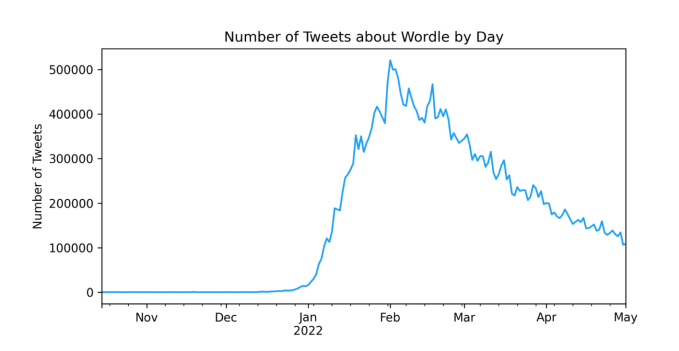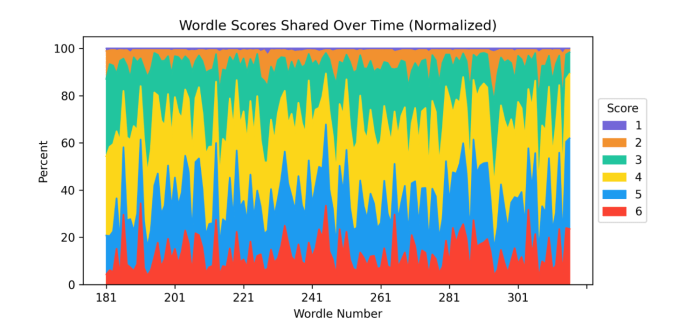The New York Times Company’s first-quarter financial results prove what we’ve all known all along: people really like Wordle.
You know the story by now. Josh Wardle made a fun little word game for his partner, shared it with some friends (who happened to be some influential tech people, since Wardle has worked at places like Reddit and MSCHF), who shared it with some more friends, and eventually it was all anyone with an internet connection could talk about.
At first, Wardle wasn’t trying to profit off his ad-free, lightweight word game. But being solely responsible for a viral word game is a big commitment, so at the end of January, he sold the game to The New York Times for an undisclosed amount in the “low seven figures.”
“If you’ve followed along with the story of Wordle, you’ll know that NYT games play a big part in its origins and so this step feels very natural to me,” Wardle said in a tweet. “When the game moves to the NYT site, it will be free to play for everyone, and I am working with them to make sure your wins and streaks will be preserved.”
About three months after Wordle’s sale to The New York Times, the paper announced that the game brought “an unprecedented tens of millions of new users to The Times.” This drove the company’s best quarter ever for net subscriber additions to Games. Even though Wordle remains free, The New York Times has been covertly advertising its other games like Spelling Bee through Wordle. A subscription to New York Times Games costs $5 per month, or $40 per year.
When Wardle spoke to TechCrunch weeks before the acquisition, he noted that New York Times Games served as an inspiration for the game. Unlike past viral games — think Flappy Bird — the game isn’t addicting, as you cannot play more than once each day. That game design is intentional.
“My partner and I play a lot of The New York Times word games, and they follow that one-a-day model,” he told TechCrunch.
Also similar to The Times, Wordle forges a sense of community among players, since everyone is solving the same puzzle. Wardle added, “One thing that is interesting to reflect on, though, is that Wordle could be one a day, but if everybody was getting a different word on that day — if the word was random but you could still only play one — it wouldn’t have caught on the way it has.”
But perhaps what propelled Wordle to an unexpected level of virality is the ease of sharing your Wordle results emoji grid.
People share their Wordle results in WhatsApp chats, Facebook posts and texts to their mom, but Twitter played a significant role in its popularity too.
Twitter data scientist Lauren Fratamico published a case study yesterday examining how Wordle spread on the platform over time.

The study revealed that 3.3 million people have tweeted about Wordle since mid-October for a total of 32.2 million tweets. Tweets about Wordle have earned over 6.6 trillion views, 58 million likes and 9 million replies.
At its peak popularity, there were 500,000 tweets about Wordle per day — but, this peak in late January coincides with The New York Times’ purchase of the game, which certainly contributed to the discourse. Even though there’s a downward trend in tweets about Wordle (now, it’s about 200,000 per day), that doesn’t necessarily mean people aren’t playing as much. Rather, maybe it became a bit cheugy to share your scores every day.
“One thing I will say is that the majority of players are not actually posting their results on Twitter,” Wardle told TechCrunch in January. “There’s an account called Wordle Stats that looks at Twitter, then collects all the grids people share, then posts it the next day and says, ‘Okay, 30% of people got it in four,’ and I think it was two days ago that it collected 100,000-something, whereas at that time, close to 2 million people played Wordle.”
In case you’re wondering, according to the sample size of people who posted Wordle results on Twitter, the hardest word was SWILL (2/19/22), which took tweeters an average of 4.88 guesses to solve. The easiest was PLANT (4/22/22), which was solved on average in 3.32 guesses.

Wordle founder Josh Wardle on going viral and what comes next
Wordle! (but not that Wordle!) is now in the hands of mobile tech firm AppLovin































Comment